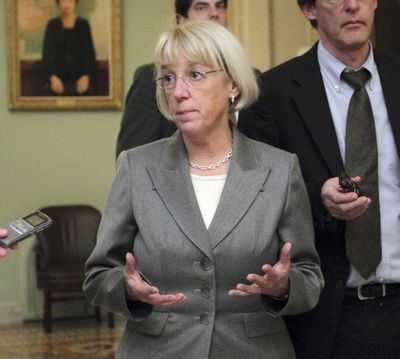National election will decide deficit strategy, says Sen. Murray

In the end, the congressional supercommittee failed to reach a deficit-cutting deal over the question of whether everyone, including the nation’s top earners, will pay for it, U.S. Sen. Patty Murray said on Tuesday.
“The fundamental problem most likely will have to be decided by a national election,” the Washington state Democrat told The Spokesman-Review. Murray served as the co-chair of the bipartisan panel.
But Congress can’t wait until next November. It must make hard decisions now, including whether to extend supplemental unemployment benefits and payroll tax breaks to a nation still in the throes of the worst economic downturn since the Great Depression.
Tying those issues to the Bush-era tax cuts “would be the wrong thing to do,” Murray said on Tuesday, the day after the supercommittee declared defeat.
It was those tax cuts, due to expire at the end of 2012, that stumped the Joint Select Committee on Deficit Reduction.
“We were able to come to agreement on everything except the revenue, and that’s where the divide became real,” Murray said.
Washington State Republican Party chairman Kirby Wilbur disagreed on Tuesday with Murray’s assertion that the Bush tax cuts, which President Barack Obama extended in December 2010, created the impasse.
“The reason behind the failure was her inability to move past that issue and come up with some real deficit-reducing ideas,” Wilbur said.
A proposal offered by committee member Sen. Patty Toomey, R-Pa., would have made the Bush tax cuts permanent and dropped taxes further – from 35 to 28 percent – for the wealthiest 2 percent of Americans.
To make up the revenue, Toomey proposed eliminating $250 billion in tax breaks. Murray said those tax breaks – on such things as college tuition and home mortgages – primarily benefit the middle class.
“I want to make sure that however we go forward, we include everybody in America and don’t put this all on the backs of just working families,” Murray said.
The panel’s inability to reach a deal puts into play $1.2 trillion in automatic cuts on everything from defense spending to food assistance for low-income families.
“Just because we couldn’t find a solution doesn’t mean the problem’s over,” Murray said, adding that automatic cuts are a poor substitute for negotiation.
“It weighs heavily on me,” the senator said. “I knew when I took on this task that I not only had to find a way to pass a budget deal but to show America that Congress can work. I think I feel worse about the second than the first.”